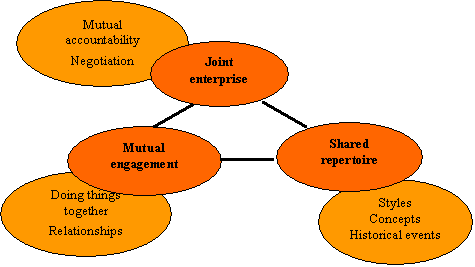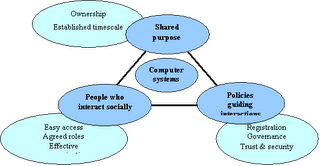Guide to discussion and collaboration spaces
28/03/2013 in About this course
Discussion and collaboration are central to the experience of ocTEL. But it’s a challenge to arrange the online discussions of 850+ people (that’s how many registrations we’ve had for the course at the time of writing). We want to make things as simple and easy to use as possible. However, we also want to provide maximum flexibility to suit individual preferences and to make it possible to manage many conversations for small groups at once – which makes it hard to keep things simple.
There are three main ways you can take part in ‘asynchronous’ (not real time) discussions in ocTEL:
- post in your own space, for example, your blog on twitter
- if you don’t have a blog or just prefer email, participate in a jiscmail list for the whole course
- for ‘specialist’ interest items or working in smaller groups and learning sets, use the web forums
In your own online space
How does it work?
- You tell us about your blog or twitter account, via the registration form (if you forgot, or if this has changed since you registered, please email octel-tech@alt.ac.uk).
- Whenever you write about the course, you include in the #ocTEL (not case sensitive) tag in your blog title or tweet.
- We pull everyone’s ocTEL blogs on one page on this site as well as providing some aggregate views of tweets (links to come when these are live).
- You can browse and read them from there, and ‘star’ individual discussions if you want to keep following them.
- We will indicate the most read and most popular items on the site and via daily ‘digest’ emails.
- (We can aggregate anything with an RSS feed and the #ocTEL tag – if you’re also producing material in another space, please let us know by sending the feed address to octel-tech@alt.ac.uk – unfortunately Facebook does not provide RSS feeds).
- If you’re slightly technically-minded, Martin Hawksey has done a screencast of this and the discussion aggregation system — a more user-friendly overview is coming soon — and has also blogged about the design approach.
When and why?
The idea is that you should write about your participation in the course in the place where you feel most comfortable and are used to writing. The course is not designed to be separate and sealed off from the rest of your life, but to be part of your life, intertwined with your other interests. This approach to online courses being distributed across the open Internet rather closeted behind virtual walls was pioneered a few years ago one or two of the early open courses.
Jiscmail list
How does it work?
- You indicate you’d like to join this list, via the registration form (if you forgot, or have changed your mind, you can apply to join via the web interface).
- We will add you to this list just before the course starts.
- You can choose whether to receive every message from the list, a daily or weekly digest, or whether to participate via the web only on the list page.
- From there you send, read and reply to messages just as you would with any other list.
When and why?
If you don’t have a blog or twitter, and don’t want to get one, this is the channel to use. Some discussions work better with the ‘push’ approach of email (for example, if quantity of responses is important) so anyone can choose to start topics there. Many of the main activities in the modules will have dedicated ‘threads’ where you can discuss your take on the activity.
Web forums
How does it work?
- You will be sent login details after you register for the course.
- Log in and edit your profile details if you wish. (If you have difficulties logging in, see the FAQ.)
- Visit the forums. You may now post new topics or reply to existing ones.
- Forum discussions are lightly moderated by ocTEL tutors.
When and why?
As we were designing the course, we realised that many of the activities could be overwhelming unless there was some way to set up discussions with a tighter focus, either in terms of people – small groups and learning sets – or in terms of topics – niche interests that might run across several modules.
This also gives us the opportunity to set up Q&A forums for the course, such as the Help, I’m Stuck peer support forum.
Additional shared spaces
Webinars
The weekly webinars (every Wednesday, mostly at lunchtime in the UK) are the one ‘live’ part of the course where we have a guest contributor who presents some ideas relevant to the theme of each module and then leads a discussion. This is also the only part of the course where the technical requirements go beyond the ‘lowest common denominator’ web browser and Internet connection. If you haven’t used Blackboard Collaborate (previously known as Elluminate) before, it might be worth checking your technical setup to see if it will support Collaborate, and checking the support information.
Bookmarks
We have an open public group on Diigo for sharing bookmarks related to the course. You can join the group and add your bookmarks there. If you prefer to use Delicious, that’s fine, just use ocTEL as a tag and we will pick it up in our bookmark aggregator. If you’re using another bookmark sharing service (with an RSS feed), please email octel-tech@alt.ac.uk and we’ll see if we can pick that up too.
Disclaimer
Large scale online discussions are an example of ‘complex adaptive systems’, which means no one can predict how they are going to turn out. It’s unlikely that things will turn out quite how we planned them.


